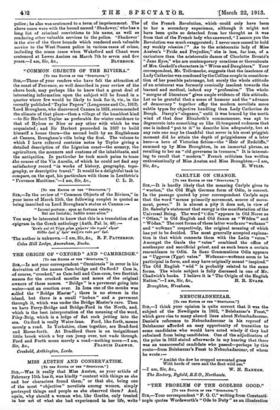CARLYLE ON CHANGE.
[To THE EDITOR OF THE "SPECTATOR."] SIR, —It is hardly likely that the meaning Carlyle gives to " wuotan," the Old High German form of Odin, is correct. In the passage quoted by your correspondent Carlyle says that the word "means primarily movement, source of move- ments power." It is almost a pity it does not, in view of Dr. Saleeby's statement that energy is the manifestation of the Universal Being. The word" Udin " appears in Old Norse as " 0-Sinn," in Old English and Old Saxon as " Woden " and " Wodan." The root forms of these latter words are " waanaz " and " woZenaz " respectively, the original meaning of which has yet to be decided. The most generally accepted explana- tion is that which connects them with the Latin " Yates." A mongst the Gauls the " Yates " combined the office of soothsayer and sacrificial priest, and as such bears a certain resemblance to Odin. In Saxo Grammaticus Odin appears as " Uggerus (Yggr) Yates." Waanaz—walSenaz seem to be participial in form, and may have originally meant " inspired." The Old English " wed " is probably related to the same forms. The whole subject is fully discussed in one of Mr. Chadwick's books. I believe it is " The Origin of the English














































 Previous page
Previous page